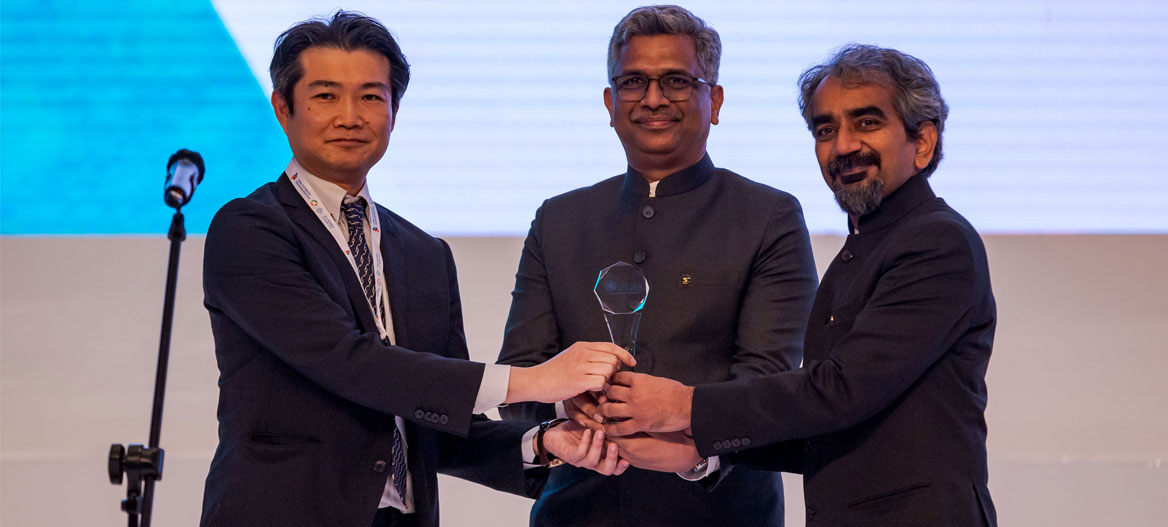
Masato Seko, Senior Program Director of Global Issues Department, The Nippon Foundation, presents the UN Sasasaka Award to Dr Manu Gupta and Dr Anshu Sharma.

SEEDS was honoured with the United Nations Sasakawa Award for Disaster Risk Reduction during the 7th session of Global Platform for Disaster Risk Reduction, that was convened by the United Nations Office for Disaster Risk Reduction (UNDRR) between 23-28 May in Bali, Indonesia.
The award is global recognition for the impact created through SEEDS’s people-centred approach and reinforces the organisation’s commitment to accountability towards stakeholders and global frameworks such as the Sendai Framework and SDGs. This also strengthens SEEDS Strategy 2030 goal to enable 315 million people across 225 climate hotspots in India to survive, adapt, and thrive despite recurring disasters.
“28 years ago, as young idealistic town planners sitting in our college canteen in a newly liberalised economy, we were concerned by the environmental impacts of what it would bring along. And it is by listening to the wisdom of the people that has helped shape our mission and purpose. I thank my dearest colleagues who spend their days and nights on the frontlines, engaging with the people. This award really goes to each one of them. Taking the opportunity of this platform, at SEEDS, we would like to call for stronger partnerships centered around agency of people as the driver for accelerated change” said Dr Manu Gupta, SEEDS on receiving the award.
In its journey over the last three decades, SEEDS has continued to build resilience throughout South Asia by partnering with governments as well as UN agencies to advocate for adopting a multi-hazard approach. The organisation has especially focused on promoting localisation agenda and empowering local leaders, pushing for policy changes evidenced by the impact on ground and building homes, safe learning spaces, and healthcare facilities by combined local wisdom and modern technology.
“A key tenet of UNDRR’s work is inclusivity. The Sendai Framework calls for inclusive disaster risk reduction to be integrated into planning, policy and funding. Unless we invest in prevention and building resilience, we will not be able to stop the spiral of disaster-response-recovery,” said Ricardo Mena, Director, UNDRR at the United Nations Sasakawa Award Ceremony on the efforts of the awardees.
The organisation’s core mission comprises helping communities prepare for future risks, investing in community-based early warning systems for first-mile connectivity, strengthening roots with nature-based solutions and leveraging technology for humanitarian action. has have been recognised through this global honour award.
The United Nations Sasakawa Award for Disaster Risk Reduction was created more than 30 years ago and is jointly organised by the United Nations Office for Disaster Risk Reduction and the Nippon Foundation. The central theme for the Sasakawa Award 2022 was “Building resilience through a multi-hazard approach.” SEEDS was among the six laureates of the 2022 United Nations Sasakawa Award for Disaster Risk Reduction who have been recognised for initiatives which protect vulnerable communities from disaster risk.
“All nominees had demonstrated great contributions, achievements, and efforts towards a sustainable commitment for Disaster Risk Reduction and Covid-19 recovery. We can clearly see the impressive life practices from all the nominees, missions, and projects, all being immensely relevant yet at the same time grounded,” commented Nuraini Rahma Hanifa, Sasakawa Award Jury Member, researcher at the Indonesian National Research and Innovation Agency, and U-INSPIRE Alliance Secretary-General.
